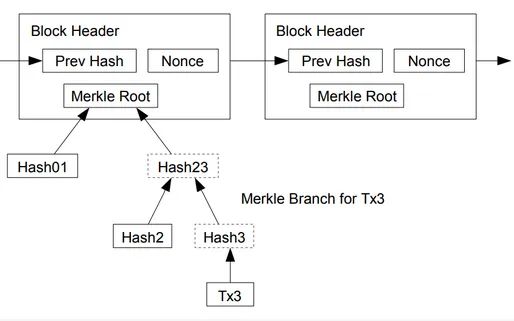没有哈希时间锁定合约的跨链原子交换
在上一篇文章中,我们介绍了使用哈希时间锁定合约(HTLC)的跨链原子交换实现。 今天,我们介绍一种无需 HTLC 即可实现的替代方法。 这将原子交换扩展到缺乏哈希锁和时间锁的区块链。
使用 SPV 证明交易已被挖掘
让我们按照商定的价格将 Alice 的 BTC 币与 Bob 的 BSV 币进行交换。
在这篇文章中,我们展示了 BSV 智能合约能够验证区块链中包含的交易。 重要的是,这是在不依赖外部预言机的情况下实现的。 基本思想是使用工作难度证明来验证区块头。 使用 Merkle 证明,我们可以验证该区块中是否包含交易,类似于链下完成的 SPV。
图片源于BSV Academy
这意味着 BSV 上的智能合约可以编程为根据 BTC 等区块链上特定交易的确认来执行特定操作。
在原子交换的背景下,智能合约本质上是这样说的:
“如果您将X BTC发送到Y地址,您就可以获得该合约中当前持有的BSV资产。”
该功能之所以成为可能,是因为 BSV 合约能够验证特定交易是否已在 BTC 区块链上成功开采。 合约可以对特定的BTC交易进行验证,确保预期的BTC金额已发送到正确的地址。
为了发起报价,Bob 在智能合约中确保 BSV 币的安全,并指定接收 BTC 所需的地址。 一旦 Alice 发送了 BTC,她就可以领取合约中锁定的 BSV。 此过程不涉及任何受信任的中介机构。
完整的协议序列
BSV 和 BTC 之间的原子交换协议可以按照以下步骤执行。
-
合约部署:Bob 在 BSV 链上部署智能合约。 该合约持有 Bob 打算与 Alice 交换的 BSV 资金。 该合同还包含故障安全时间锁。
-
付款和证明:Alice 将约定数量的 BTC 在 BTC 链上发送给 Bob。 在该交易被开采到区块中后,她获得了该交易的 Merkle 证明。 请注意,这是一个简单的支付交易,没有 HLTC。
-
验证和解锁:Alice 将 Merkle 证明提交给 BSV 合约。 合约验证证明并确认将 Alice 的 BTC 交易包含给 Bob。 如果证明得到验证,Alice 就可以解锁并领取合约中的 BSV 资金。
如果Bob没有及时收到付款,他可以在时间锁定到期后取回他的币。
请注意,智能合约是在 BTC 付款广播之前部署的。 这样,Alice 就能保证在向 Bob 付款后,她会收到正确金额的 BSV。 该锁定时间还必须足够长,以便支付交易能够在 BTC 上进行挖掘。
通过稍加修改,Alice 在 Bob 合约部署时甚至可以是未知的。 Bob 的报价是公开的,任何人向他支付适量的 BTC 都可以解锁他锁定的 BSV。
与基于 HTLC 的原子交换相比
这种方法的一个关键优点是,即使对于没有哈希锁或时间锁的区块链,它也可以实现原子交换。 只要有一种机制可以不信任地证明其中包含交易(例如,使用 Merkle 证明),则具有智能合约功能来验证该证明的其他链就可以与其进行交换。
实现
在 BSV 中,智能合约可以在 sCrypt 中实现,如下所示。
export type VarIntRes = {
val: bigint
newIdx: bigint
}
class CrossChainSwap2 extends SmartContract {
static readonly LOCKTIME_BLOCK_HEIGHT_MARKER = 500000000
static readonly UINT_MAX = 0xffffffffn
static readonly MIN_CONF = 3
static readonly BTC_MAX_INPUTS = 3
@prop()
readonly aliceAddr: PubKeyHash
@prop()
readonly bobAddr: PubKeyHash
@prop()
readonly bobP2WPKHAddr: PubKeyHash
@prop()
readonly timeout: bigint // Can be a timestamp or block height.
@prop()
readonly targetDifficulty: bigint
@prop()
readonly amountBTC: bigint
@prop()
readonly amountBSV: bigint
// ...
@method()
checkBtcTx(btcTx: ByteString): void {
// Most things should be the same as in BSV except the witness data and flag.
// - Check (first) output is P2WPKH to Bobs public key.
// - Check (first) output amount is equal to this.amountBTC
let idx = 4n
// Make sure to serialize BTC tx without witness data.
// See https://github.com/karask/python-bitcoin-utils/blob/a41c7a1e546985b759e6eb2ae4524f466be809ca/bitcoinutils/transactions.py#L913
assert(
slice(btcTx, idx, idx + 2n) != toByteString('0001'),
'Witness data present. Please serialize without witness data.'
)
INPUTS:
const inLen = CrossChainSwap2.parseVarInt(btcTx, idx)
assert(
inLen.val <= BigInt(CrossChainSwap2.BTC_MAX_INPUTS),
'Number of inputs too large.'
)
idx = inLen.newIdx
for (let i = 0n; i < CrossChainSwap2.BTC_MAX_INPUTS; i++) {
if (i < inLen.val) {
//const prevTxID = slice(btcTx, idx, idx + 32n)
idx += 32n
//const outIdx = slice(btcTx, idx, idx + 4n)
idx += 4n
const scriptLen = CrossChainSwap2.parseVarInt(btcTx, idx)
idx = scriptLen.newIdx
idx += scriptLen.val
//const nSequence = slice(btcTx, idx, idx + 4n)
idx += 4n
}
}
FIRST OUTPUT:
// Check if (first) output pays Bob the right amount and terminate and set res to true.
const outLen = CrossChainSwap2.parseVarInt(btcTx, idx)
idx = outLen.newIdx
const amount = Utils.fromLEUnsigned(slice(btcTx, idx, idx + 8n))
assert(amount == this.amountBTC, 'Invalid BTC output amount.')
idx += 8n
const scriptLen = CrossChainSwap2.parseVarInt(btcTx, idx)
idx = scriptLen.newIdx
const script = slice(btcTx, idx, idx + scriptLen.val)
assert(len(script) == 22n, 'Invalid locking script length.')
assert(
script == toByteString('0014') + this.bobP2WPKHAddr,
'Invalid locking script.'
)
// Data past this point is not relevant in our use-case.
}
@method()
public swap(
btcTx: ByteString,
merkleProof: MerkleProof,
headers: FixedArray<BlockHeader, typeof CrossChainSwap2.MIN_CONF>,
alicePubKey: PubKey,
aliceSig: Sig
) {
// Check btc tx.
this.checkBtcTx(btcTx)
// Calc merkle root.
const txID = hash256(btcTx)
const merkleRoot = MerklePath.calcMerkleRoot(txID, merkleProof)
// Check if merkle root is included in the first BH.
assert(
merkleRoot == headers[0].merkleRoot,
"Merkle root of proof doesn't match the one in the BH."
)
// Check target diff for headers.
for (let i = 0; i < CrossChainSwap2.MIN_CONF; i++) {
assert(
Blockchain.isValidBlockHeader(
headers[i],
this.targetDifficulty
),
`${i}-nth BH doesn't meet target difficulty`
)
}
// Check header chain.
let h = Blockchain.blockHeaderHash(headers[0])
for (let i = 0; i < CrossChainSwap2.MIN_CONF; i++) {
if (i >= 1n) {
const header = headers[i]
// Check if prev block hash matches.
assert(
header.prevBlockHash == h,
`${i}-th BH wrong prevBlockHash`
)
// Update header hash.
h = Blockchain.blockHeaderHash(header)
}
}
// Verify Alices signature.
assert(hash160(alicePubKey) == this.aliceAddr, 'Alice wrong pub key.')
assert(this.checkSig(aliceSig, alicePubKey))
}
@method()
public cancel(bobPubKey: PubKey, bobSig: Sig) {
// Ensure nSequence is less than UINT_MAX.
assert(
this.ctx.sequence < CrossChainSwap2.UINT_MAX,
'input sequence should less than UINT_MAX'
)
// Check if using block height.
if (this.timeout < CrossChainSwap2.LOCKTIME_BLOCK_HEIGHT_MARKER) {
// Enforce nLocktime field to also use block height.
assert(
this.ctx.locktime <
CrossChainSwap2.LOCKTIME_BLOCK_HEIGHT_MARKER,
'locktime should be less than 500000000'
)
}
assert(
this.ctx.locktime >= this.timeout,
'locktime has not yet expired'
)
// Verify Bobs signature.
assert(hash160(bobPubKey) == this.bobAddr, 'Bob wrong pub key.')
assert(this.checkSig(bobSig, bobPubKey))
}
}
源码文件crosschainswap2.ts
智能合约有两个公共方法:
swap():如果 Alice 提供了她向 Bob 支付了足够数量的 BTC 的证据,则 Alice 会调用该函数来获取资金。cancel():由 Bob 在指定的时间过后调用以提取资金。
完整的代码和测试可以在 GitHub 上找到。

